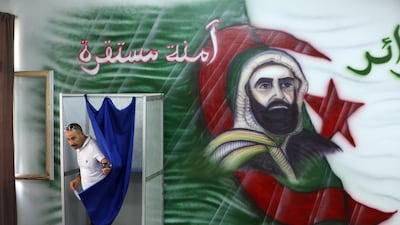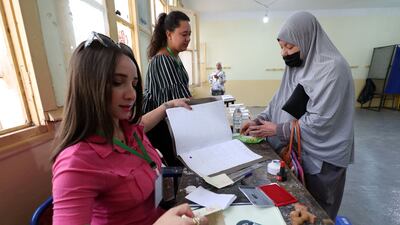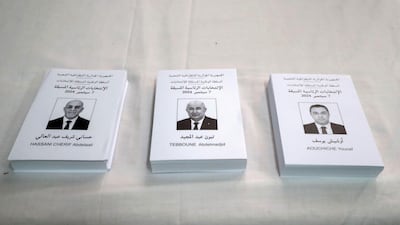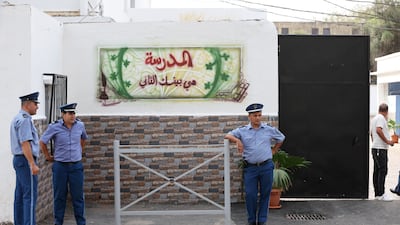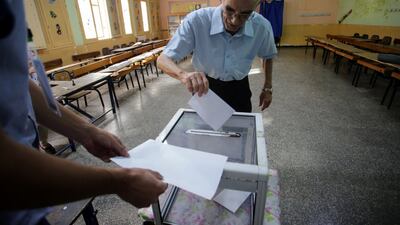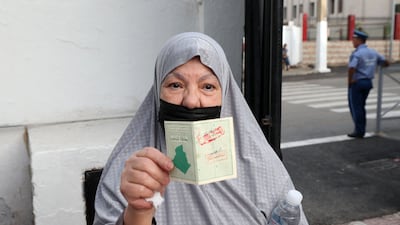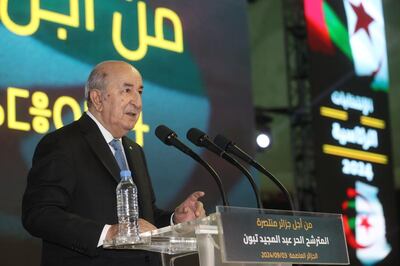Algeria was holding its presidential election on Saturday with President Abdelmajid Tebboune widely expected to win a second five-year term.
About 24 million people are eligible to vote in the election, which pits Mr Tebboune against secular candidate Youcef Aouchiche of the Socialist Forces Front and Abdelaali Hassani Cherif of the Movement of Society for Peace, an Islamist party.
The National Independent Election Authority (ANIE) said on Friday that all preparations were complete and that it would conduct the poll according to its “constitutional obligations of neutrality, transparency, and preserving the freedom of choice of the voter”. About 13,000 polling stations have been set up across Algeria's 58 governorates, including 139 mobile stations for Bedouin communities and residents of remote villages in the south. Voting is scheduled to take place from 8am until 7pm.
More than 800,000 Algerians living overseas began casting ballots on Monday. The ANIE said it set up 117 commissions to oversee the voting, including 18 in France, 30 in the rest of Europe, 22 in Arab countries, 21 in African countries, and 26 in Asia and America.
Polling got off to a slow start, with the election authority saying 4.46 per cent of voters cast ballots in the first two hours after polls opened, the official APS news agency reported.
Mr Tebboune, who came to power in December 2019 following months of pro-democracy protests that removed his predecessor, long-time president Abdelaziz Bouteflika, is considered the favourite.
“Unfortunately Tebboune is the closest to power both in terms of his practical and tactical capabilities and especially because he is the one that the military and people above are relying on,” Amira Drid, 31, a resident of north-western city of Tlemcen, told The National.
“He has also been able to maintain his title as a populist that makes a large proportion of the people support him.”
Algeria has a long history of overlap between the military and the civil state’s governing institutions. The military's influence in all branches of authority has continued to grow since the country’s independence from France in 1962.
Ms Drid said that of Mr Tebboune's rivals, Mr Cherif possibly has the better chance of finishing second because of his affiliation with political Islam.
“Competition is going to be mainly between Tebboune and Hassani [Cherif] as Islamist parties are known for their grass roots mobilisation capacity, they have people that adopt their ideas and who will certainly show up to cast their votes,” she said.
Reflecting a growing apathy towards politics among Algerians in recent years after the pro-democracy protests, known as the Hirak Movement, were suppressed, Ms Drid said that she was boycotting the presidential election.
“All three candidates do not represent me. Even Youcef Aouchiche, whom I find myself closer to in terms of thoughts. He is not a leadership figure and cannot become president in any way,” she said.
As Algeria continues to face challenges domestically, such as rising youth unemployment, and regionally, with security threats from unrest across its borders in Mali, Niger and Libya, many believe that a strong leadership must be maintained.
“Unfortunately, even though I disagree with him, Tebboune is the only one capable of leading us in the upcoming stage,” Ms Drid said.
“The opposition and all other personalities have not been able to organise themselves and come up with the needed solid plans for our future.”
COMPANY PROFILE
Company name: BorrowMe (BorrowMe.com)
Date started: August 2021
Founder: Nour Sabri
Based: Dubai, UAE
Sector: E-commerce / Marketplace
Size: Two employees
Funding stage: Seed investment
Initial investment: $200,000
Investors: Amr Manaa (director, PwC Middle East)
Trump v Khan
2016: Feud begins after Khan criticised Trump’s proposed Muslim travel ban to US
2017: Trump criticises Khan’s ‘no reason to be alarmed’ response to London Bridge terror attacks
2019: Trump calls Khan a “stone cold loser” before first state visit
2019: Trump tweets about “Khan’s Londonistan”, calling him “a national disgrace”
2022: Khan’s office attributes rise in Islamophobic abuse against the major to hostility stoked during Trump’s presidency
July 2025 During a golfing trip to Scotland, Trump calls Khan “a nasty person”
Sept 2025 Trump blames Khan for London’s “stabbings and the dirt and the filth”.
Dec 2025 Trump suggests migrants got Khan elected, calls him a “horrible, vicious, disgusting mayor”
COMPANY%20PROFILE
%3Cp%3E%3Cstrong%3EName%3A%20%3C%2Fstrong%3EQureos%0D%3Cbr%3E%3Cstrong%3EBased%3A%20%3C%2Fstrong%3EUAE%0D%3Cbr%3E%3Cstrong%3ELaunch%20year%3A%20%3C%2Fstrong%3E2021%0D%3Cbr%3E%3Cstrong%3ENumber%20of%20employees%3A%20%3C%2Fstrong%3E33%0D%3Cbr%3E%3Cstrong%3ESector%3A%20%3C%2Fstrong%3ESoftware%20and%20technology%0D%3Cbr%3E%3Cstrong%3EFunding%3A%20%3C%2Fstrong%3E%243%20million%0D%3Cbr%3E%3C%2Fp%3E%0A
Fifa%20World%20Cup%20Qatar%202022%20
%3Cp%3E%3Cstrong%3EFirst%20match%3A%20%3C%2Fstrong%3ENovember%2020%0D%3Cbr%3E%3Cstrong%3EFinal%2016%20round%3A%20%3C%2Fstrong%3EDecember%203%20to%206%0D%3Cbr%3E%3Cstrong%3EQuarter-finals%3A%20%3C%2Fstrong%3EDecember%209%20and%2010%0D%3Cbr%3E%3Cstrong%3ESemi-finals%3A%20%3C%2Fstrong%3EDecember%2013%20and%2014%0D%3Cbr%3E%3Cstrong%3EFinal%3A%20%3C%2Fstrong%3EDecember%2018%3C%2Fp%3E%0A
Disclaimer
Director: Alfonso Cuaron
Stars: Cate Blanchett, Kevin Kline, Lesley Manville
Rating: 4/5
INFO
What: DP World Tour Championship
When: November 21-24
Where: Jumeirah Golf Estates, Dubai
Tickets: www.ticketmaster.ae.
The specs
Engine: 3.0-litre twin-turbo flat-six
Power: 480hp at 6,500rpm
Torque: 570Nm from 2,300-5,000rpm
Transmission: 8-speed dual-clutch auto
Fuel consumption: 10.4L/100km
Price: from Dh547,600
On sale: now
What sanctions would be reimposed?
Under ‘snapback’, measures imposed on Iran by the UN Security Council in six resolutions would be restored, including:
- An arms embargo
- A ban on uranium enrichment and reprocessing
- A ban on launches and other activities with ballistic missiles capable of delivering nuclear weapons, as well as ballistic missile technology transfer and technical assistance
- A targeted global asset freeze and travel ban on Iranian individuals and entities
- Authorisation for countries to inspect Iran Air Cargo and Islamic Republic of Iran Shipping Lines cargoes for banned goods
UAE%20SQUAD
%3Cp%3EMuhammad%20Waseem%20(captain)%2C%20Aayan%20Khan%2C%20Aryan%20Lakra%2C%20Ashwanth%20Valthapa%2C%20Asif%20Khan%2C%20Aryansh%20Sharma%2C%20CP%20Rizwaan%2C%20Hazrat%20Billal%2C%20Junaid%20Siddique%2C%20Karthik%20Meiyappan%2C%20Rohan%20Mustafa%2C%20Vriitya%20Aravind%2C%20Zahoor%20Khan%20and%20Zawar%20Farid.%3C%2Fp%3E%0A
Dubai Bling season three
Cast: Loujain Adada, Zeina Khoury, Farhana Bodi, Ebraheem Al Samadi, Mona Kattan, and couples Safa & Fahad Siddiqui and DJ Bliss & Danya Mohammed
Rating: 1/5
COMPANY%20PROFILE
%3Cp%3E%3Cstrong%3EName%3A%20%3C%2Fstrong%3ESmartCrowd%0D%3Cbr%3E%3Cstrong%3EStarted%3A%20%3C%2Fstrong%3E2018%0D%3Cbr%3E%3Cstrong%3EFounder%3A%20%3C%2Fstrong%3ESiddiq%20Farid%20and%20Musfique%20Ahmed%0D%3Cbr%3E%3Cstrong%3EBased%3A%20%3C%2Fstrong%3EDubai%0D%3Cbr%3E%3Cstrong%3ESector%3A%20%3C%2Fstrong%3EFinTech%20%2F%20PropTech%0D%3Cbr%3E%3Cstrong%3EInitial%20investment%3A%20%3C%2Fstrong%3E%24650%2C000%0D%3Cbr%3E%3Cstrong%3ECurrent%20number%20of%20staff%3A%3C%2Fstrong%3E%2035%0D%3Cbr%3E%3Cstrong%3EInvestment%20stage%3A%20%3C%2Fstrong%3ESeries%20A%0D%3Cbr%3E%3Cstrong%3EInvestors%3A%20%3C%2Fstrong%3EVarious%20institutional%20investors%20and%20notable%20angel%20investors%20(500%20MENA%2C%20Shurooq%2C%20Mada%2C%20Seedstar%2C%20Tricap)%3C%2Fp%3E%0A
Company Profile:
Name: The Protein Bakeshop
Date of start: 2013
Founders: Rashi Chowdhary and Saad Umerani
Based: Dubai
Size, number of employees: 12
Funding/investors: $400,000 (2018)
Need to know
When: October 17 until November 10
Cost: Entry is free but some events require prior registration
Where: Various locations including National Theatre (Abu Dhabi), Abu Dhabi Cultural Center, Zayed University Promenade, Beach Rotana (Abu Dhabi), Vox Cinemas at Yas Mall, Sharjah Youth Center
What: The Korea Festival will feature art exhibitions, a B-boy dance show, a mini K-pop concert, traditional dance and music performances, food tastings, a beauty seminar, and more.
For more information: www.koreafestivaluae.com
Profile of Foodics
Founders: Ahmad AlZaini and Mosab AlOthmani
Based: Riyadh
Sector: Software
Employees: 150
Amount raised: $8m through seed and Series A - Series B raise ongoing
Funders: Raed Advanced Investment Co, Al-Riyadh Al Walid Investment Co, 500 Falcons, SWM Investment, AlShoaibah SPV, Faith Capital, Technology Investments Co, Savour Holding, Future Resources, Derayah Custody Co.
The specs
Engine: 2.2-litre, turbodiesel
Transmission: 6-speed auto
Power: 160hp
Torque: 385Nm
Price: Dh116,900
On sale: now
Scoreline
Liverpool 3
Mane (7'), Salah (69'), Firmino (90')
Bournemouth 0
Director: Laxman Utekar
Cast: Vicky Kaushal, Akshaye Khanna, Diana Penty, Vineet Kumar Singh, Rashmika Mandanna
Rating: 1/5
Most sought after workplace benefits in the UAE
- Flexible work arrangements
- Pension support
- Mental well-being assistance
- Insurance coverage for optical, dental, alternative medicine, cancer screening
- Financial well-being incentives
CHELSEA'S NEXT FIVE GAMES
Mar 10: Norwich(A)
Mar 13: Newcastle(H)
Mar 16: Lille(A)
Mar 19: Middlesbrough(A)
Apr 2: Brentford(H)
COMPANY%20PROFILE%20
%3Cp%3E%3Cstrong%3ECompany%20name%3A%20%3C%2Fstrong%3ENomad%20Homes%3Cbr%3E%3Cstrong%3EStarted%3A%20%3C%2Fstrong%3E2020%3Cbr%3E%3Cstrong%3EFounders%3A%20%3C%2Fstrong%3EHelen%20Chen%2C%20Damien%20Drap%2C%20and%20Dan%20Piehler%3Cbr%3E%3Cstrong%3EBased%3A%3C%2Fstrong%3E%20UAE%20and%20Europe%3Cbr%3E%3Cstrong%3EIndustry%3C%2Fstrong%3E%3A%20PropTech%3Cbr%3E%3Cstrong%3EFunds%20raised%20so%20far%3A%3C%2Fstrong%3E%20%2444m%3Cbr%3E%3Cstrong%3EInvestors%3A%3C%2Fstrong%3E%20Acrew%20Capital%2C%2001%20Advisors%2C%20HighSage%20Ventures%2C%20Abstract%20Ventures%2C%20Partech%2C%20Precursor%20Ventures%2C%20Potluck%20Ventures%2C%20Knollwood%20and%20several%20undisclosed%20hedge%20funds%3C%2Fp%3E%0A
Labour dispute
The insured employee may still file an ILOE claim even if a labour dispute is ongoing post termination, but the insurer may suspend or reject payment, until the courts resolve the dispute, especially if the reason for termination is contested. The outcome of the labour court proceedings can directly affect eligibility.
- Abdullah Ishnaneh, Partner, BSA Law
